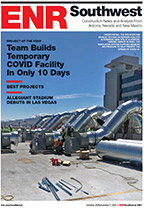Stakes are high for gaming giant MGM Mirage Inc.’s $8.5-billion CityCenter development on the Las Vegas Strip. The project’s turbulent history includes the death of six construction workers, a lawsuit between development partners over rising costs and funding woes brought on by the global credit crisis. Yet the 18-million-sq-ft complex of hotels, condos, casinos and entertainment space still is scheduled to open in phases, starting on Dec. 1.



The debut of the mega-resort comes amid a deepening recession in hard-hit Las Vegas, where there has been fewer visitors and less spending. Billed as the largest private development in the U.S., CityCenter’s success or failure may ultimately determine MGM Mirage’s financial future as well as that of Las Vegas, observers say. “They are opening the project during the worse economic downturn since the Great Depression,” says John Restrepo, principal of Restrepo Consulting Group, a Las Vegas-based economic research firm. “Its importance cannot be underestimated.”
CityCenter will create 12,000 new jobs in Nevada, which had the nation’s second-highest unemployment rate at 13.3% in September and nearly double the level of a year ago, says the state Dept. of Employment Training and Rehabilitation.
Once defined by boom growth, southern Nevada has seen a sharp reversal of fortune with an 11.9% third-quarter drop in gaming revenue and a 20.2% decline in state sales taxes since 2008, public records show.
Much of the downturn is tied to the cancellation or delay of resort development because of the worsening financial outlook. “Southern Nevada’s economy is dependent upon discretionary spending,” says Keith Schwer, director of the Center for Business and Economic Research at the University of Nevada, Las Vegas. “In an economic downturn, that is the first type of spending that will be cut back,” he adds.
In October, MGM Mirage wrote down CityCenter’s value by $955 million, adding another $348-million write-down from lagging condo sales. CityCenter last month cut condo prices by 30% in response to dropping property values and frozen credit conditions. Sales began at the peak of the housing boom in January 2007. “We believe that in this economic climate, this price reduction is an appropriate step to take on behalf of our buyers so as to provide them greater flexibility in closing on their residences,” says CityCenter President and CEO Bobby Baldwin.
Changing market conditions and construction problems with the Harmon, one of seven buildings at CityCenter, prompted MGM Mirage to earlier this year eliminate 200 condos. The action leaves the development with 6,000 hotel rooms and 2,400 condos on 67 acres. CityCenter’s sizable room inventory could cannibalize the city’s resort market and lower occupancy rates, some analysts fear.
“The economic crisis has been hard on Las Vegas, and the hospitality industry has borne the brunt of declining spending and travel,” says MGM Chairman and CEO Jim Murren in a statement. “After two years of declining visitor volume, more visitors will come to Las Vegas in 2010, and it will be because of CityCenter.”
Stock of MGM Mirage recently traded on the New York Stock Exchange at $9.65 a share, down 44% from a 52-week high of $17.30. The stock traded as high as $99.75 a share in October 2007. MGM Mirage two years ago took on an investment partner by selling a 50% stake in CityCenter to Infinity World Development Corp., a unit of Dubai World, for $2.96-billion.
“CityCenter is very important from an investment standpoint because Las Vegas has been thought of very negatively over the last year,” says Grant Govertson, a principal with Union Gaming Group, a Las Vegas-based market research firm. “There is a tremendous trickle-down impact that is critical to the Las Vegas economy.”
The project carries perhaps even greater importance for the construction industry, which will lose 8,700 jobs in the city when the project is completed. The industry employed 84,400 people in Nevada in September, or 38.2% fewer than in 2008. CityCenter’s construction payroll reportedly exceeded $3 million per day, according to industry sources who requested anonymity. Construction, once Nevada’s second-biggest employer, has lost 32,800 jobs during the last year.
CityCenter’s poor safety record has led to stronger enforcement statewide of construction safety practices. Worker deaths between 2007 and 2008 culminated in union picketing, which ended with mandatory paid 10-hour U.S. Occupational Safety and Health Administration (OSHA) training for everyone on the project site.
The situation also led to a major shakeup of the federal safety agency’s Nevada division, as well as to state legislation requiring the 10-hour safety training on all projects, starting on Jan. 1, 2011.
CityCenter’s more immediate impact could be to resurrect or sink Las Vegas’ flagging tourism industry. If the impact is positive, it possibly will give new life to stalled projects, according to some observers. “Competitors are going to be watching it very intensely,” says Govertson, who believes the project could be the last new casino-resort built in Las Vegas for the next five to 10 years. “Everyone wants to see it be a success,” he says. “We think it will be showstopper, exceeding expectations, which are quite low at the moment due to the economy.”

